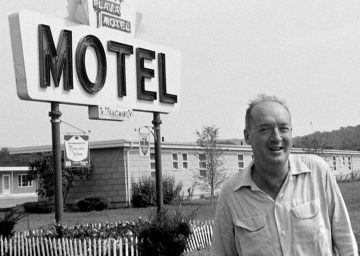Elsa Court in Granta:
 In 1956, Vladimir Nabokov was defending his novel Lolita against claims of anti-Americanism. He called them preposterous. The accusation of anti-American bias in Lolita was based on the novel’s treatment of postwar America’s mass culture, which the novel’s European narrator does register with a mixture of skepticism and exhilaration. But this contempt, Nabokov wrote in an afterword to the book, was Humbert’s, not his own. His intention, he argued, was to analyse America from the perspective of a newly-minted American author. To steep himself in the baffling world of roadside service that seemed to characterize his new home.
In 1956, Vladimir Nabokov was defending his novel Lolita against claims of anti-Americanism. He called them preposterous. The accusation of anti-American bias in Lolita was based on the novel’s treatment of postwar America’s mass culture, which the novel’s European narrator does register with a mixture of skepticism and exhilaration. But this contempt, Nabokov wrote in an afterword to the book, was Humbert’s, not his own. His intention, he argued, was to analyse America from the perspective of a newly-minted American author. To steep himself in the baffling world of roadside service that seemed to characterize his new home.
Lolita chronicles America’s mass media culture – Hollywood, soda ads, glossy magazines – but focuses on the country’s relationship with the automobile, which had created two new all-American settings for Nabokov to explore: the sprawling yet self-contained suburbs on the one hand, and a booming roadside service system on the other. Nabokov tackles both. He describes the suburb’s stifling social environment in the first part of the book — with its polite book clubs, lakeside picnics, intensified domesticity and class uniformity. Part two turns to roadside architecture, a sampling ground for another ritual of modern living, based on leisurely movement and family vacations.
More here.
